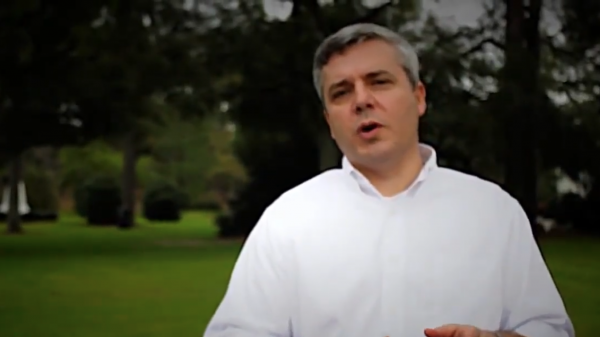By Chip Brownlee
Alabama Political Reporter
MONTGOMERY — He escaped death seven times, but he didn’t escape the eighth. The Alabama Department of Corrections executed death row inmate, Thomas “Tommy” Arthur, late Thursday night after several hours of delays.
Arthur was put to death by lethal injection at Holman Correctional Facility in Atmore, Alabama, using a controversial three-drug cocktail. He had been convicted for the 1982 murder-for-hire of North Alabama businessman, Troy Wicker.
According to reports from selected reporters who were in the room, superficially appeared to go peacefully. Unlike some facing execution recently, including Ronald Smith, who was executed in December, Arthur did not heave or gasp for air.
He was administered the sedative drug Midazolam at about 11:50 p.m. — only 10 minutes before his death warrant — then began drifting into unconsciousness, according to reporters at the scene. He died at about 12:15 a.m. on May 26.
The US Supreme Court, which intervened in Arthur’s previously scheduled execution date in November, denied an emergency request for a stay of execution. The order denying that stay came late at about 10:45 p.m.
Arthur had previously gone to the US Supreme Court in hopes that they would strike down the State’s use of the controversial sedative Midazolam, which Arthur’s attorneys argued could not properly perform the job sedating him so his execution would be painless. They also asked the Court to intervene allowing his attorneys to have access to a phone in case the execution went wrong.
Supreme Court Associate Justice Sonya Sotomayor, a longtime opponent of the death penalty, dissented from the court’s majority opinion writing, “I continue to doubt whether midazolam is capable of rendering prisoners insensate to the excruciating pain of lethal injection and thus whether midazolam may be constitutionally used in lethal injection protocols.”
She said the State had “no legitimate reason” to prevent his attorneys from possessing a phone during the execution “particularly in light of the demonstrated risk that midazolam will fail.”
According to the selected reporters on the scene, Arthur apologized to his family before being put to death. “I am sorry I failed you as a father,” he said. “I love you more than anything on earth.”
Arthur seemed to have accepted his fate in a recent interview with the Associated Press, saying “they’re going to kill me this time,” but he nevertheless maintained his innocence.
“I did not commit that crime,” Arthur told the AP’s Kim Chandler. “I won’t give up ’til I draw my last breath. I won’t give up.”
Arthur had a strong legal team behind him, preventing seven previous execution dates. A man confessed to the murder Arthur was convicted of, but a court ruled the confession unfounded. Arthur’s attorneys asked for a new DNA test to prove he did not commit the crime, but Gov. Kay Ivey last month denied that request.
Shortly after Arthur’s execution at Holman, Ivey issued a statement on his execution.
“No Governor covets the responsibility of weighing the merits of life or death, but it is a burden I accept as part of my pledge to uphold the laws of this State,” Ivey said. “Mr. Arthur was rightfully convicted and sentenced, and tonight, that sentence was rightfully and justly carried out.”
Arthur, who is now 75, was first convicted of capital murder in 1982 but faced two subsequent trials after the first two were overturned. His death sentence came in 1991 during the third trial.
He has been given now eight execution dates since 2001. A jury found him guilty of the murder of Wicker, the wife of whom Arthur was accused of having an affair with. The wife, Judy, said she hired Arthur, her lover, to kill her husband Troy.
In November, US Supreme Court Chief Justice John Roberts issued a stay from the Court delaying Arthur’s scheduled Nov. 3 execution. The stay was to give the other justices time to decide whether to take up Arthur’s case challenging Alabama’s three-drug cocktail.
They ultimately denied that request for a writ of certiorari.
Arthur’s attorneys argued that Midazolam, the first of three drugs in Alabama’s cocktail, would fail to do its job of sedating the inmate to prevent pain during the induction of the two other live-taking drugs, violating the Eight Amendment’s prohibition on cruel and unusual punishment.
In Glossip v. Gross, the US Supreme Court ruled 5–4 that the use of Midazolam as a sedative was not unconstitutional, allowing its use to continue, but Arthur argues that his preexisting heart condition would render Midazolam ineffective.
In December, death-row inmate Ronald Smith reportedly heaved and coughed for nearly 15 minutes while being executed at Holman. His attorneys called the execution botched. ADOC officials said it went as planned. Arthur’s attorneys feared the same thing would happen with him.
It didn’t, reporters and ADOC officials on the scene said.
Arthur had previously asked for alternative excution methods including firing squad and different drug cocktails. Courts had denied those requests citing Alabama statues that now limit execution to lethal injection. The Courts said Arthur’s attorneys offered no other legal alternatives for their consideration.
Arthur’s execution is the third since the state had a two-year hiatus in executions. In January 2016, Christopher Brooks, a 43-year-old convicted murderer and rapist, became the first inmate executed in Alabama after the hiatus thanks to the rising scarcity of Midazolam and court litigation. Smith became the second in December 2016.
Though he had success in preventing his execution, Arthur wasn’t exactly a perfect plaintiff. He escaped prison in 1986 before his second trial by shooting a prison correctional officer who later died. And Wicker’s death wasn’t his first murder. In 1977, Arthur was convicted of killing Eloise Bray West but was released from prison on a work release program before committing Wicker’s murder.
Alabama Attorney General Steven Marshall said Arthur’s execution would begin the long-delayed process of recover for Wicker’s family.
“Thirty-four years after he was first sentenced to death for the murder of a Colbert County man, Thomas Arthur’s protracted attempt to escape justice is finally at an end,” Marshall said.
Email Chip Brownlee at [email protected] or follow him on Twitter.


















































